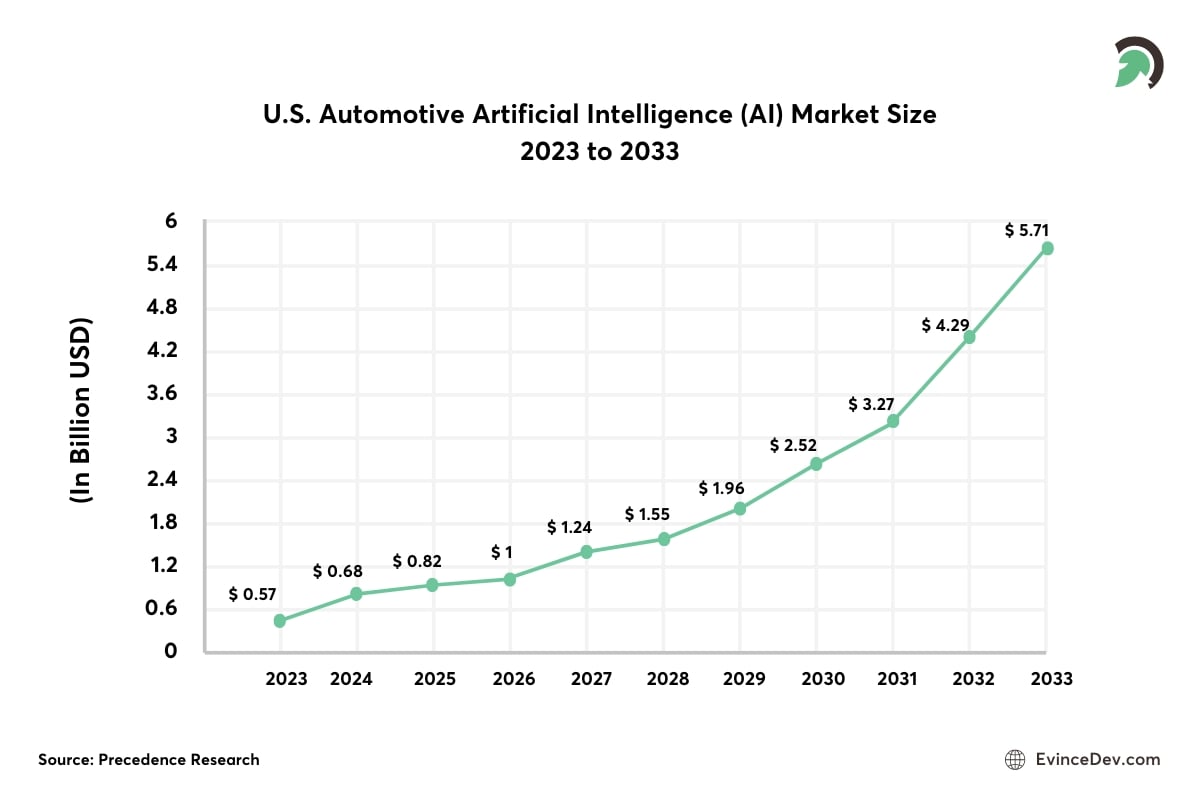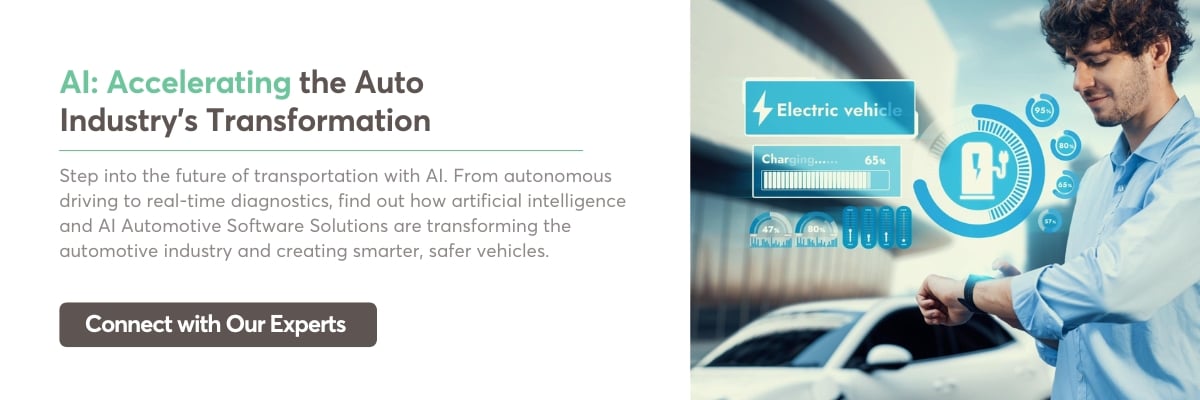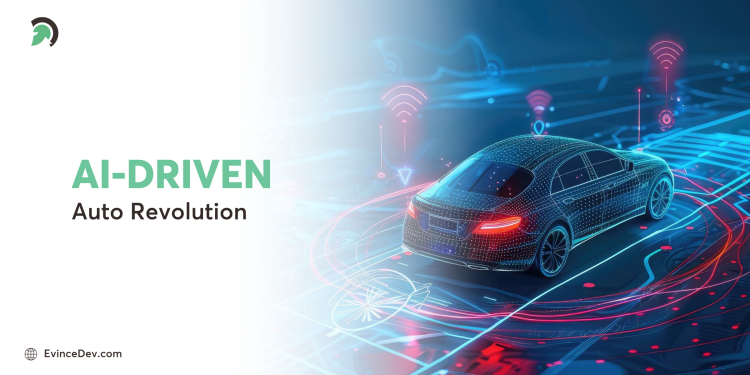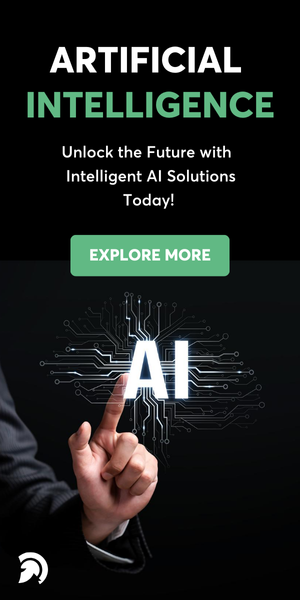Artificial intelligence (AI) has revolutionized the world for years, including the automotive industry.
Integrating AI development solutions such as machine learning, computer vision, and natural language processing is revolutionizing vehicle design, manufacturing, and operation.
From autonomous driving to predictive maintenance and beyond, AI in automotive industry is driving the automotive sector into a new era of innovation, efficiency, and safety.
The blog below will explore how AI has impacted the automotive industry, providing insights into its market growth, custom software application development, notable examples, and future trends.
How Has AI affected the Auto Body Industry?
The integration of automotive artificial intelligence is not just a futuristic concept; it’s a present reality with tangible impacts.
According to Markets and Markets, the global AI in the automotive market was valued at $2.3 billion in 2022. It is projected to reach $7 billion in 2027 at a CAGR of 24.1%.
In the United States alone, the AI automotive market size is expected to grow from $0.57 billion in 2023 to $5.71 billion by 2033, at a CAGR of 26.6%.

The auto body industry, in particular, has seen significant enhancements due to AI. AI-powered systems are being utilized to streamline manufacturing processes, reduce human error, and ensure higher vehicle safety and reliability standards.
For example, artificial intelligence in car manufacturing plants and AI-driven robotics can perform tasks with high precision & consistency, significantly reducing the risk of defects and improving overall production quality.
Moreover, artificial intelligence in automotive industry is revolutionizing the way auto body repairs are handled. By 2030, autonomous automobiles will account for around 12% to 17% of total vehicle sales.
Advanced AI-driven diagnostic tools can quickly and accurately assess the extent of damage in an accident, helping repair shops provide more accurate estimates and reduce repair times.
It enhances customer satisfaction and increases the efficiency and profitability of auto body repair businesses.
Essential Benefits of AI In the Automotive Industry
From advanced driver monitoring systems to predictive maintenance, AI transforms how vehicles are designed, manufactured, and operated. Here are some key benefits of AI in automotive industry:
Driver Monitoring
Driver monitoring systems (DMS) use AI to enhance road safety by monitoring the driver’s behavior. Such systems can detect signs of drowsiness, distraction, or other forms of impaired driving and alert the driver or take corrective action.
The NHTSA revealed that drowsy driving led to 91,000 crashes in 2017 alone. AI-driven DMS can significantly reduce such incidents, saving lives and reducing injuries on the road.
Additionally, some advanced systems can adjust vehicle controls to mitigate risks when a driver is deemed unfit to operate the vehicle safely.
Combating Insurance Fraud
Insurance fraud is a common issue in the automotive industry, costing billions of dollars annually. AI helps identify patterns and anomalies in claims data that may indicate fraudulent activities.
According to the FBI, insurance fraud (excluding health insurance) increases the average U.S. family’s premiums by between $400 and $700 annually.
AI-powered fraud detection systems can manage large volumes of data faster and more precisely than people, thereby fighting the problem.
For example, AI can analyze data from vehicle telematics, accident reports, and historical claims to detect inconsistencies and flag suspicious claims for further investigation.
Predictive Maintenance
Predictive maintenance utilizes AI to analyze data from various vehicle sensors to predict when parts will likely fail. The proactive approach can prevent breakdowns and reduce maintenance costs.
According to a study, predictive maintenance can reduce maintenance costs by 18-25% and increase production by 5-15%. It enhances vehicle reliability and customer satisfaction.
By anticipating issues before they occur, automotive service providers can ensure that vehicles remain in optimal condition, extending their lifespan and enhancing their resale value.
Vehicle Diagnostics Remotely
Remote vehicle diagnostics powered by AI allow real-time monitoring and diagnosing vehicle issues without needing a physical inspection.
Such a technology enables faster detection and resolution of problems, minimizing vehicle downtime and driver inconvenience.
It estimates that the market for remote vehicle diagnostics will reach USD 36.12 billion by 2030, growing at a CAGR of 16.5% from 2024 to 2030.
The capability is precious for fleet operators, as it enables them to monitor the health of their entire fleet remotely, ensuring that any potential issues are addressed promptly and efficiently.
Personalized Voice Assistants
AI-powered voice assistants enhance the driving experience by providing hands-free control over various functions such as navigation, climate control, and entertainment.
Such assistants can learn from drivers’ preferences and behaviors, offering a more personalized and intuitive user experience.
According to Custom Market Insights, the global automotive voice recognition system market was valued at $5.2 Bn in 2024, and it will grow $15.4 Bn at a CAGR of 15.7% by 2024-2033.
Voice assistants improve convenience and contribute to safer driving by allowing drivers to keep their hands on the wheel and their eyes on the road while interacting with their vehicle’s systems.
Real-World Examples of AI in the Automotive Industry
Artificial intelligence (AI) significantly impacts the automotive industry, with leading companies using AI application development services to innovate and improve their operations, products, and services.
Here are some notable examples of how major players in the industry are utilizing AI:
Tesla
Tesla has been at the forefront of integrating AI into its vehicles, particularly with its Autopilot and Full Self-Driving (FSD) capabilities. The company uses AI for tasks ranging from autonomous driving to predictive maintenance.
Tesla’s AI-driven features have significantly improved vehicle safety and efficiency. For example, according to the company’s safety report, Tesla’s Autopilot has been reported to have reduced crash rates by up to 40% due to AI in cars.
Additionally, Tesla’s continuous over-the-air updates, powered by AI, allow for the ongoing improvement of vehicle performance and the introduction of new features, keeping vehicles updated with technology throughout their lifecycle.
Waymo
Waymo, a subsidiary of Alphabet Inc., is a leader in autonomous vehicle technology. Waymo’s self-driving cars use AI for real-time traffic analysis, obstacle detection, and decision-making.
As of 2021, Waymo’s vehicles have driven over 20 million miles autonomously on public roads, demonstrating the reliability and effectiveness of AI in automotive and navigating complex driving environments.
Waymo’s AI systems are designed to handle many driving scenarios, from busy city streets to quiet suburban roads, showcasing the potential of fully autonomous vehicles to operate safely and efficiently in diverse conditions.
NVIDIA
NVIDIA is crucial in providing AI hardware and nearshore software development services for the automotive industry. Its DRIVE platform enables automakers to develop autonomous vehicles and advanced driver-assistance systems (ADAS).
Several major car manufacturers use NVIDIA’s AI technologies to enhance vehicle performance and safety. For example, Volvo’s ADAS system, powered by NVIDIA, significantly reduces the likelihood of accidents.
NVIDIA’s powerful GPUs and AI algorithms process data from vehicle sensors in real-time, enabling advanced features such as collision avoidance, lane-keeping, and adaptive cruise control.
BMW
BMW utilizes AI in its operations, from manufacturing to driving assistance. The company’s AI-based systems optimize production processes, enhancing efficiency and reducing defects.
On the road, BMW’s Intelligent Personal Assistant, powered by AI, offers a smooth and personalized driving experience. BMW’s use of AI has improved production efficiency and significantly increased customer satisfaction.
Furthermore, BMW’s AI-driven manufacturing processes ensure high levels of precision and quality control, resulting in vehicles that meet the brand’s exacting standards for performance and reliability.

What is the Trend in Artificial Intelligence in Automotive Industry?
AI is driving several key trends in the automotive industry, shaping the future of AI in automotive industry and transportation. Here are some of the most significant trends:
Autonomous Vehicles
The development of fully autonomous vehicles remains one of the most transformative trends in the automotive industry. Companies like Waymo, Tesla, and traditional automakers are investing heavily in AI to make self-driving cars a reality.
According to Allied Market Research, the worldwide autonomous vehicle industry is estimated to reach $556.67 billion by 2026, pushed by AI and machine learning advances.
Autonomous vehicles can improve transportation by lowering accidents, easing traffic congestion, and giving people unable to drive mobility options.
Advanced Driver-Assistance Systems (ADAS)
ADAS technologies, which include features like lane-keeping assistance, adaptive cruise control, & automatic emergency braking, are becoming increasingly common.
AI is crucial for such systems to function effectively, as it processes real-time data from sensors and cameras to make split-second decisions.
According to MarketsandMarkets, the ADAS market is projected to grow from 334 million units in 2024 to 655 million units by 2030. As ADAS technologies become more sophisticated, they cover the way for higher levels of vehicle robotics and enhance overall road safety.
Predictive Maintenance
Predictive maintenance is another growing trend. AI is being used to analyze vehicle data and predict potential failures before they occur. The approach improves vehicle reliability and reduces maintenance costs and downtime.
Predictive maintenance uses AI to monitor the condition of critical components, enabling timely interventions that prevent costly breakdowns and extend vehicle lifespans.
AI in Manufacturing
AI is also revolutionizing automotive manufacturing, making production lines more efficient and reducing waste. AI-driven robots and systems are used for welding, painting, and assembly tasks, ensuring high precision and consistency.
AI-powered quality control systems can detect defects in real-time, allowing immediate corrections and minimizing the risk of defective products reaching customers.
Path Planning and Navigation
AI enhances path planning and navigation systems, enabling vehicles to navigate complex environments more effectively. They use AI to process data from various sources, such as GPS, cameras, and sensors, to determine the best route and avoid obstacles.
The market for AI-based path planning and navigation systems is expected to grow significantly, driven by the demand for autonomous vehicles and advanced ADAS features.
AI-powered navigation systems can adapt to changing traffic conditions and provide real-time route optimization, improving travel efficiency and reducing fuel consumption.
Drive Innovation with EvinceDev: Take the Wheel on AI Solutions in Automotive
AI is transforming the automotive industry, offering numerous benefits and driving innovation across various domains.
From autonomous driving and predictive maintenance to personalized user experiences and enhanced manufacturing processes, AI is paving the way for a brighter and more efficient future in automotive.
By staying updated on such trends and using advanced AI solutions, businesses can improve operations and provide superior customer value.
Outsourcing software development can be an intelligent move for businesses looking to utilize the power of AI. Partnering with AI software development services experts can accelerate innovation and bring cutting-edge solutions to market faster.
For those interested in exploring AI solutions for their automotive projects, consider a FREE Consultation from AI app development company EvinceDev. Embrace the future of automotive innovation with AI and drive your business towards success.




